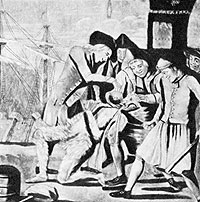

Temple's Diary
A Tale of Benjamin Franklin's Family
In the Days Leading up to The American Revolution
I am now the owner of an elegant blue diary with a tricky clasp. After handing it to me, Grandfather wrote on the first page: "I hope this is filled with good news and good cheer."
I wish I could oblige but the atmosphere around Franklin Court is somber, to say the least. I knew something was wrong the minute Aunt Sally greeted me — affectionately, to be sure, but with a hug that could be called tepid, compared to what she is capable of. Aunt Sally looks much thinner than when I left three months ago, and her eyes are swollen. The problem is baby Hannah, pink and chubby when she was born, but now unable to keep down most of her food, the doctor does not know why.
The victim of the situation is Willy who cannot accept that his mother's attention is not centered on him anymore. He spends his time fussing and whining, is threatened with a spanking if he does not stop, whines even louder, receives said spanking, howls still louder, and ends up sobbing himself to sleep. Benny is withdrawing into himself and hardly speaks.
Consequently, I go out on long walks alone, as college is still one month away. Even Philadelphia, so welcoming at first, seems to have gone sour during my absence.

Tar and feathering
Yesterday, for instance, I witnessed a shocking episode. My attention was attracted by a loud tune I never heard before. Walking towards the music, I saw it was performed by a drum and fife almost drowned out by a jeering crowd. "What's that tune?" I asked a young man. "Don't you know the Rogues' March?" he snapped. I mumbled something to the effect that I had just arrived. Somewhat softened, he explained that the Rogues' March is the musical accompaniment of the parade and punishment of Loyalists who disobey the rules of the Committee of Inspection. In this case, the man being roughly mounted on a cart, his hand bleeding from a bayonet wound, is a well-known citizen, a Dr. Kearsley, who became so enraged at the sight of a certain Loyalist made to apologize over and over in the most abject manner, that he opened his window, drew his pistol and fired in the air above the crowd. And now it is his turn to be insulted and possibly tarred-and-feathered, a form of torture that can sometimes lead to death.
My informant, highly excited by the crowd's anger, asks where I came from. The first faraway place I can think of is Vermont. That explains my funny accent, he says, and promptly invites me to move on with him, not to miss a minute of the grim proceedings. I thank him, but remain in place. Seeing someone thus humiliated, a middle-aged man who could have been one of my father's friends, is a dreadful thing. It is as if the humiliation splashes over onto you yourself. When Grandfather was insulted in the Cockpit back in London, a year and a half ago, it was different. He had stood erect. He kept his dignity. He was not at the mercy of a furious mob. But this Dr. Kearsley, what will they do to him? What will they do to my own father, some day, if he stands in opposition to the Patriots?
I hurry all the way home and sit down to write a long letter to Father and Elizabeth, thanking them for the lovely summer they have given me, what with my own horse and my own dog — have I forgotten to mention him earlier, my wonderful Scott? Back in school I often won the prize for English composition. "You show great promise, dear boy," Mr. Elphinston would purr. "Your use of our sublime language is most elegant."
I feel much better after writing my letter and am relieved to hear from Uncle Richard at supper that when Dr. Kearsley's noisy parade reached the State House, the very people who had seized him became worried by the mob's frenzy and brought him back home. But as soon as they left, some of the unruly crowd threw stones through the Doctor's windows and vandalized his belongings. Throughout his ordeal, he never apologized. Aunt Sally explains sadly that Dr. Kearsley is a brilliant man who has done research on the yellow fever that devastated Philadelphia in 1762. As to Uncle Richard, he mutters that the Doctor had better learn to watch his temper if he wants to survive.
